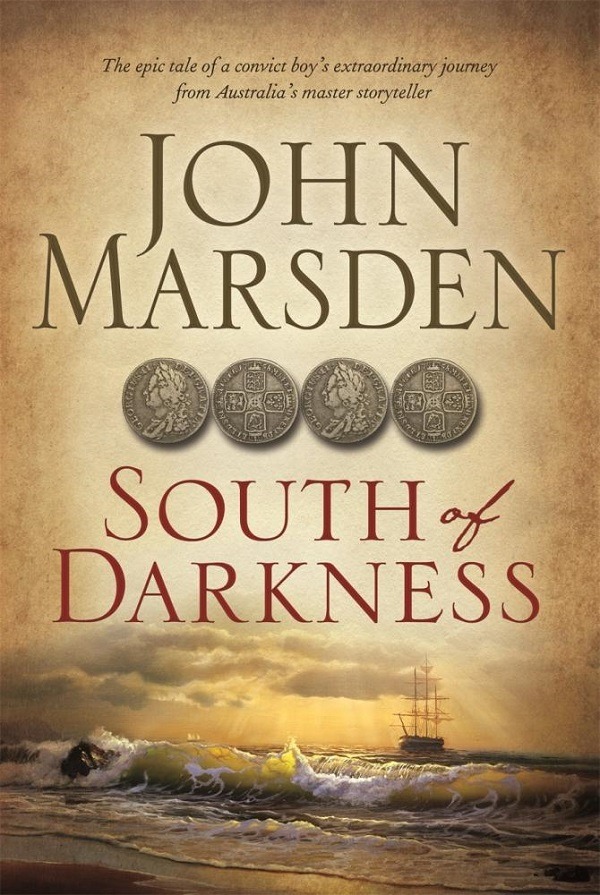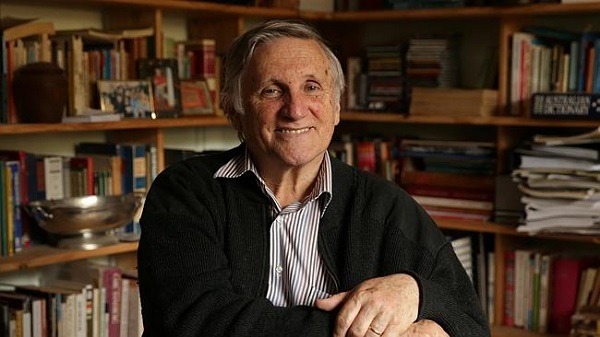On Saturday morning, the Richard Wherrett Studio of the Rosyln Packer Theatre packed a full crowd. As excited audience members filtered through the wide doors, clutching their half-read books, and chatting away to strangers beside them, festival volunteers urged them to leave no gaps in the seating.
Our guest for the day was John Marsden, author of the hugely popular Tomorrow Series. Having sold over two-and-a-half million books worldwide, Marsden is introduced by Cath Keenan as ‘Australia’s most successful writer for young people.’ But today, he is here to discuss his latest venture: his first novel for adults.
South of Darkness follows the journey of a young, convict boy, named Barnaby Fletch. Barnaby spent his childhood as an orphan on the streets of London, and believes he can find a brighter future in the new, penal colony of Australia. He thus sets out to be transported as a thief. However, Barnaby soon finds there are more challenges he must struggle to survive, before he can ever reach ‘paradise’. (You can buy South of Darkness here.)

The Shift From YA to Adult Fiction
So why, after twenty-eight years, writing for children and young adults, has Marsden now turned to adult fiction?
According to Marsden, the change did not come as any conscious decision.
I tend to write on impulse,” he said.
He then proceeded to tell the story of going on holiday with his wife, and beginning South of Darkness on the plane. When the plane landed, Marsden found himself shutting the laptop quite reluctantly, and turned to his wife to say, ‘I think this one is actually working.’
I couldn’t wait to get to the hotel and open the computer… So our holiday took a very different turn!” he laughed.
When asked what makes this novel for adults, Marsden confessed to being unsure of the marked difference.
The only obvious things are the language patterns and vocabulary are slightly different.”
Among the other distinctions Marsden added, was a different way of dealing with certain issues, such as sex.
Not because of any reasons of censorship, but because of my own prudishness, I don’t write explicit sex-scenes much,” he reflected.
Research for South of Darkness
When asked what sort of research was involved, Marsden revealed that the novel was partly born from a lifelong love of history and reading. When it came to focussed research, however, Marsden relied heavily on first hand accounts of early, colonial Australia. Theses helped immensely in portraying the right ‘vibe of the time’. He also credits Children of the Desert, by Géza Róheim, as the source he referenced most often, when providing Barnaby’s observations of Indigenous tribal life.
Themes of South of Darkness
In discussing the novel, certain themes emerged, that Marsden wished to explore. These included the following:
The Myth of the Innocence of Childhood
Marsden spoke (on multiple occasions), of the misconception that children are inherently innocent. In contrast, Marsden asserted that what we perceive as innocence is actually ignorance. He also further suggested that children do not like being ignorant, and are constantly seeking a deeper understanding of life. This is a sentiment that is certainly expressed in the novel.
As I got older I was becoming increasingly embarrassed by my ignorance of the world…” – Barnaby Fletch in ‘South of Darkness’, Chapter 24, p183.
“Children can be generous. They can be gentle. They can be kind… But they can also be cruel. They can be mean… They can be treacherous… So, they’re just like us. They can have a whole range of personality traits.”
The Myth of the Benevolent Beauty of Nature
Marsden expressed a belief that people have a tendency to over romanticise nature. To demonstrate this, he shared a story about travelling through the Northern Territory with his colleagues. When they stopped by a billabong to share a drink on their final night, a flock of ducks could be seen, congregating on the other side.
There was just wild scenes going on,” he told, “ducks chasing each other, drakes raping ducks, feathers flying… squawks, and yowls, and all kinds of things… And the person next to me took another sip of her glass, and sighed, and said, ‘Isn’t nature beautiful?’”
In South of Darkness, Marsden wanted to challenge this mindset, and show that nature (and humankind) are multifaceted.
There is beauty in nature, there is peace in nature, but there’s also savagery.”
The Myth that One Culture is More Wholesome or Brutal than Another
In South of Darkness, young Barnaby is, at times, struck by the brutality with which Indigenous men treat women of the tribe. However, at the same time, the Indigenous people find just as much brutality in European culture. Particularly in the flogging punishments, administered to convicts. Marsden commented on this, advocating that he didn’t want to portray either culture as any more wholesome or barbaric than the other. Instead, he wished to show the potential for all humans to be capable of great kindness, and yet, great savagery.
I don’t think that you can single out any special group over time as being somehow endowed with more spirituality than, perhaps, any other group.”

Advice for Writers of Historical Fiction
So, what if you are planning your own Historical Novel? What advice does John Marsden have for you? Well, before the event came to a close, I asked him this very question. Here was his response:
The research is really, obviously, important, but you’ve got to not let that overwhelm the book. It’s got to be woven into the book so subtly that the reader doesn’t realise that they’re being… educated at the same time as they’re reading.”
“One of the joys for me in reading, is reading a book where the writer knows what they’re talking about, and they have an expertise that I don’t have. Even if they use terms that I don’t even understand, I still find that really satisfying… Just something about knowing that you’re in the hands of an expert… and that we’re able to get an entrée into that world by reading these books.”
“I also think it’s important to avoid imposing modern ideologies onto different societies and different eras… And you also, obviously, have to avoid the language… The number of times the word ‘ok’ is used in films or books that are set hundreds of years ago is just ridiculous!”
“It’s got to be authentic.”
***
Writer’s Edit would like to thank Sydney Writers’ Festival for the array of wonderful events hosted, and for providing us with access to them. Looking forward to next year’s already!